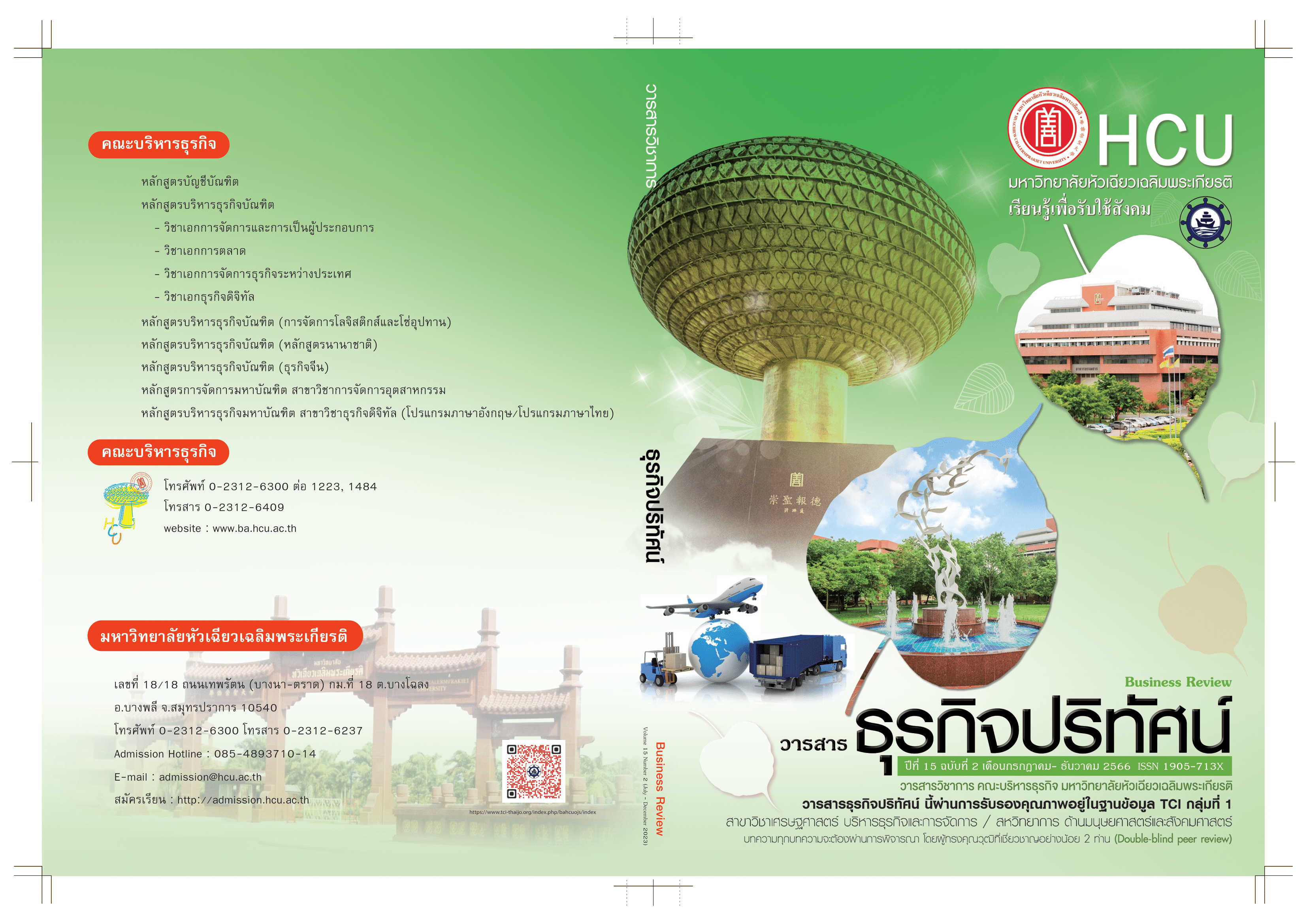A Study of Technology Acceptance Model Affecting on Attitude toward the Use of Android Smartphone
Keywords:
Personal Factors, Technology Acceptance, Attitude, Android SmartphoneAbstract
This aims of this research is to explore 1) The impact of different individual factors on attitudes towards the use of android smart phones, 2) The effect of different perceived of technologies on attitudes towards the use of android smart phones. This research is quantitative research where questionnaires were utilized as a tool to collecting data. The population of the survey were those who have used or using Android smart phones and resided in Bangkok and vicinity provinces. Sample of the research were 385 people. Statistics of this research were one-way Anova
Results of the research demonstrated that the samples who were Android smart phone users had high levels of perceived usefulness of technologies, while the ease of use of Android smart phones were at medium level. In terms of personal factors, including the diffential of age, education, occupation and average monthly income were contributed to the attitudes towards the use of Android smart phones, excepting the diffential of genders had no effect on the attitudes toward the use of Android smart phone. Research hypotheses founded that the different perceived of technologies were contributed to the different attitudes towards the use of Android smart phones.
References
จักรพงษ์ สื่อประเสริฐสิทธิ์. (2554). ปัจจัยที่มีอิทธิพลต่อการยอมรับเทคโนโลยี: กรณีศึกษาการใช้บริการการสื่อสารระหว่างกันผ่านข้อความและรูปภาพแบบทันทีผ่านโทรศัพท์เคลื่อนที่ในเขตกรุงเทพมหานคร. วิทยานิพนธ์ปริญญามหาบัณฑิต, มหาวิทยาลัยธรรมศาสตร์
นิรนาม. 2563. ความคิดเห็นของผู้คน. (online). https://gs.statcounter.com/search-engine-market-share). 6 มิถุนายน 2563
ยุทธ ไกยวรรณ์. 2551. การเลือกใช้สถิติที่เหมาะสม. กรุงเทพมหานคร: ศูนย์สื่อเสริมกรุงเทพ.
สิงหะ ฉวีสุข และ สุนันทา วงศ์จตุรภัทร. 2555. ทฤษฎีการยอมรับการใช้เทคโนโลยีสารสนเทศ. วารสารเทคโนโลยีสาระสนเทศลาดกระบัง. 1(1): 1-21.
Almasri, A. (2014), “The Influence on Mobile Learning Based on Technology Acceptance Model (TAM) Mobile Readiness (MR) And Perceived Interaction (PI) For Higher Education Students”. International Journal of Technical Research and Applications, Volume-2, Special Issue 1 (July-Aug 2014), 05-11.
Cocia, M. (2018), “Functionality development of product innovation: An empirical analysis of the technological trajectories of smartphone”. Journal of Economics Library - J. Econ. Lib. - JEL, vol. 5, n. 3, 241-258.
Davis, F. D. (1989), "Perceived usefulness, perceived ease of use, and user acceptance of information technology", MIS Quarterly, 13 (3): 319–340..
Davis, F. D.; Bagozzi, R. P.; Warshaw, P. R. (1989), "User acceptance of computer technology: A comparison of two theoretical models", Management Science, 35 (8): 982–1003.
Fishbein, M. (1967). “A Behavior Theory Approach to the Relations between Beliefs about An Object and the Attitude Toward the Object”. In M. Fishbein (Ed.), Readings in Attitude Theory and Measurement (pp. 389-400). New York: John Wiley & Sons.
Kim, H and Lee, C. W. (2018). “The Effects of Customer Perception and Participation in Sustainable Supply Chain Management: A Smartphone Industry Study”, Sustainability 2018, 10 (7), 2271.
Kotler, P. and K. L. Keller. 2018. Marketing Management. 15th ed. New Jersey: PrenticeHall.
Leng, G. S., S. Lada, M. Z. Muhammad, A. A. H. A. Ibrahim, and T. Amboala. 2011. “An Expolration of social Networking Sites (SNS) Adoption in Malaysia Using Technology Acceptance Model (TAM), Theory of Planned Behavior (TPB) And Intrinsic Motivation.” Journal of Internet Banking & Commerce 16 (2): 1-27.
Njigua, R. W. (2018), “Influence of personal factors on consumer purchase decisions of mobile phones in Nairobi County, Kenya”, A Thesis for the Degree of Master of Commerce at Strathmore University.
Oh, C. G. and Park, J. P. (2019). “Insights for Sustainability of Smartphone Business: Understanding Customer Switching Behavior in Smartphone Services”, Sustainability 2020, 12(3), 167- 182.
Schiffman, L.G. and Kanuk, L.L. (2010) Consumer Behavior, 10th Edition, Prentice-Hall,
Englewood Cliffs, N.J.. Silaban, D. P.; Saerang,, D.P.E., and Rumokoy, F.S., (2014). “Analyzing The Personal Factors Influencing Purchase Decision of Smartphone in Manado”, Engineering, 2(1) 124-132.
Venkatesh, V.; Bala, H. (2008), "Technology Acceptance Model 3 and a Research Agenda on Interventions", Decision Sciences, 39 (2): 273–315.
Venkatesh, V., Thong, J. Y. L., and Xu, X. (2012). Consumer acceptance and use of information technology: Extending the Unified Theory of Acceptance and Use of Technology, MIS Quarterly, 36(1), 157–178.
Vyshnavi, S.P.V. and Venkata, R. (2016). “Factors Affecting Mobile Phone Purchase and Its Usage – A Study of Teacher and Office Staff of Colleges in Kavali Town”, International Journal of Current Advanced Research. 5. 1387.
Wu, J. H. and Wang, S C. (2005), "What Drives Mobile Commerce? An Empirical Evaluation of the revised Technology Acceptance Model." Information and Management, 42 (5): 719–729.
Yang, H. W. and Zhou, L. N. (2011), “Extending TPB and TAM to mobile viral marketing: An exploratory study on American young consumers’ mobile viral marketing attitude, intent and behavior”, Journal of Targeting, Measurement and Analysis for Marketing volume 19, 85–98.
Sek, Y. W., Lau, S. H., Teoh, K. K., Law, C. Y. and Parumo, S. B., (2010). “Prediction of User Acceptance and Adoption of Smart Phone for Learning with Technology Acceptance Model”. Journal of Applied Sciences, 10: 2395-2402
Downloads
Published
How to Cite
Issue
Section
License
Copyright (c) 2023 Business Review Journal

This work is licensed under a Creative Commons Attribution-NonCommercial-NoDerivatives 4.0 International License.
All articles published in the Business Administration and Management Journal Review are copyrighted by the journal.
The views and opinions expressed in each article are solely those of the individual authors and do not represent those of Huachiew Chalermprakiet University or any other faculty members. Each author is fully responsible for the content of their own article. Any errors or issues found are the sole responsibility of the respective author.




